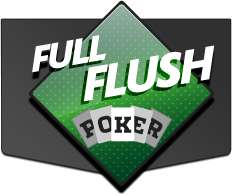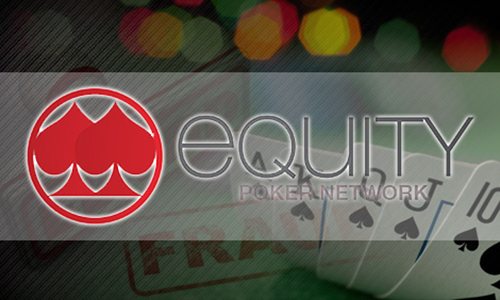Equity Poker Network, Full Flush Poker Downtime Continues, Future in Doubt
The continuing and unexplained downtime for the struggling Equity Poker Network and its flagship online-poker site, Full Flush Poker, is looking more and more like the end of the run for Equity, despite thin claims to the contrary offered via the site’s social-media outlet. Network operations have been offline for over a week, along with the front-end pages of both Full Flush and the Equity Network itself. Yet trying to uncover exactly what’s happening at Equity reveals uncertainty, even as Full Flush players continue waiting on long-promised (but not delivered) withdrawals, many dating back well over a year.
 The EPN was founded back in March of 2013 by Clive Archer, a long-time veteran of the online-gambling scene. Archer cut his gambling-industry teeth as part of the old BetOnSports [BOS] operation, and promoted the Equity Network’s debut with much fanfare three years ago. Included in the network’s launch ballyhoo were the promise of business-to-business fairness, including a “shark tax” that would penalize network skins who catered to less-recreational, “grinder”-type players, rather than marketing to casual, less experienced players.
The EPN was founded back in March of 2013 by Clive Archer, a long-time veteran of the online-gambling scene. Archer cut his gambling-industry teeth as part of the old BetOnSports [BOS] operation, and promoted the Equity Network’s debut with much fanfare three years ago. Included in the network’s launch ballyhoo were the promise of business-to-business fairness, including a “shark tax” that would penalize network skins who catered to less-recreational, “grinder”-type players, rather than marketing to casual, less experienced players.
Equity did draw a copy of veteran online operations to the network and launched in late 2013 with five skins onboard. However, achieving critical mass has always been a problem, and as early as the middle of 2015, cash-flow issues became evident. It was about then that the network’s players — in particular at the network’s flagship site, Full Flush — began reporting extensive delays in receiving requested cashouts.
As 2015 rolled into 2016, that problem became much, much worse. Despite that, in something of a reprise of the old Lock Poker shambles, a small handful of Equity affiliates continued heavily promoting Full Flush and Equity, even as those withdrawal requests continued to be ignored. Such circumstances have occurred before… and frankly, they’ve never turned out well.
The Full Flush situation became worse earlier this year, when the site’s excuses for paying out became ridiculous and players began selling their online balances at deep discounts, usually just a few nickels or dimes on the dollar. Speaking of dimes, the more reputable skins and companies on the network also began an exodus of those own, led by 5Dimes, Gear Poker, and of most recent vintage, Heritage Sports.
That so many sites have left what was a smallish network to start could only have made the network’s finances even more precarious. Earlier this year, Full Flush reported that it had been “sold” to new owners, even though the limited licensing ownership data available online, via the rubber-stamp Curacao licensing regime, still seemingly shows Full Flush, the parent Equity network, and a couple of unrelated sites all owned by the same entity, Equity Marketing Management B.V.
After the “sale” of Full Flush, one of the network’s primary affiliates, “Kahntrutahn,” was attacked by numerous affected FF players over the alleged purchase of existing FF balances at significant discounts, which he was then, purportedly, able to cash out through his own contacts with the site. With no comment as to ethics of this practice, which has also been employed at other struggling, slow-pay sites, this writer merely notes that there is typically only so much withdrawal money to be dispensed, and that players themselves generally lose in such arrangements, either getting only small percentages of such funds or being shuffled back down waiting payout lists.
Through it all, Full Flush and the EPN kept processing a slow trickle of withdrawal requests, usually via Moneygram, while fully ignoring larger-amount withdrawal requests and ignoring most of the promised payout channels, such as check or wire transfer. (Whether or not the EPN and Full Flush encountered payment-processor issues has never been divulged, though other US-facing “gray market” sites have not experienced similar problems of late.)
And then, around October 3rd, with only a trickle of play taking place, the Equity Poker Network itself went offline. Late last month, one poker-news outlet had reported seeing the FullFlushPoker.com domain listed for sale, but that seems to have been a domain-poaching error. However, several domains associated with Full Flush and the Equity Poker Network remain offline, despite promises that the downtime was due to a move to a new software platform and that updates on the situation would be provided daily.
Indeed, the FullFlushPoker.com domain is online, but it shows only a brief message, put up via a WordPress plugin:
Important notice
We are in the process of updating our gaming solutions to offer a new, more exciting platform to meet the needs of our players and an ever changing industry. We will have updates on this change each day for you, and we apologize for any inconveniences we have caused during this period.
Also available is a “Live Chat” option, though it’s been sparsely manned, according to reports. And a sub-header at the top of the page urges concerned players to call “+469 7723411,” which is actually a vaguely-munged version of a plain old US-based phone number (469 area code), based in the Dallas suburb of Nevada, Texas. Yes, that raises even more questions about who’s behind Full Flush and the Equity network at the present time.
Is it possible that Full Flush and Equity can rebound, pay off at least the several hundred thousand dollars known to be owed to players who have already made withdrawal requests, and resume normal, profit-making operations. Sure, anything is possible, but it doesn’t look good. For Archer, the network’s founder, the probable demise of Equity will make him a three-time loser; in addition to the BOSports debacle, he was also involved in the Action Sports entity, which collapsed and disappeared also without refunding its customers.
Over at the Curacao license regime, the Equity-related sites show as being suspended. Despite Equity’s and Full Flush’s claims of moving to a new platform, and as correctly noted in some other reports, the only known instances of Curacao suspending an existing license were because of nonpayment of licensing fees. Equity also has been removed from PokerScout’s tracking of online-poker sites and networks, due to no actual poker being played on the site for quite some time.
As seen in the Lock Poker debacle, sites an appear to remain in operation long after the music has stopped playing and the band has hit the road. Though the dollars involved aren’t of the same magnitude, that’s of scant comfort to those players who likely won’t receive their funds. Barring something such as a cash infusion from true, new owners, Full Flush and Equity look to be the latest entry in the litany of failed and poorly regulated sites.




















COMMENTS